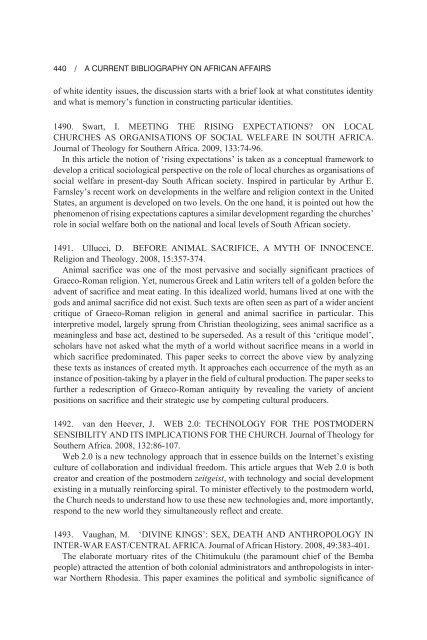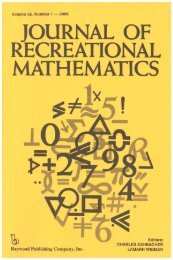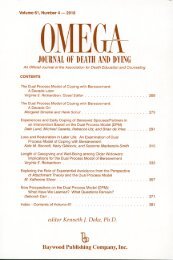A Current Bibliography on African Affairs - Baywood Publishing
A Current Bibliography on African Affairs - Baywood Publishing
A Current Bibliography on African Affairs - Baywood Publishing
Create successful ePaper yourself
Turn your PDF publications into a flip-book with our unique Google optimized e-Paper software.
440 / A CURRENT BIBLIOGRAPHY ON AFRICAN AFFAIRS<br />
of white identity issues, the discussi<strong>on</strong> starts with a brief look at what c<strong>on</strong>stitutes identity<br />
and what is memory’s functi<strong>on</strong> in c<strong>on</strong>structing particular identities.<br />
1490. Swart, I. MEETING THE RISING EXPECTATIONS? ON LOCAL<br />
CHURCHES AS ORGANISATIONS OF SOCIAL WELFARE IN SOUTH AFRICA.<br />
Journal of Theology for Southern Africa. 2009, 133:74-96.<br />
In this article the noti<strong>on</strong> of ‘rising expectati<strong>on</strong>s’ is taken as a c<strong>on</strong>ceptual framework to<br />
develop a critical sociological perspective <strong>on</strong> the role of local churches as organisati<strong>on</strong>s of<br />
social welfare in present-day South <strong>African</strong> society. Inspired in particular by Arthur E.<br />
Farnsley’s recent work <strong>on</strong> developments in the welfare and religi<strong>on</strong> c<strong>on</strong>text in the United<br />
States, an argument is developed <strong>on</strong> two levels. On the <strong>on</strong>e hand, it is pointed out how the<br />
phenomen<strong>on</strong> of rising expectati<strong>on</strong>s captures a similar development regarding the churches’<br />
role in social welfare both <strong>on</strong> the nati<strong>on</strong>al and local levels of South <strong>African</strong> society.<br />
1491. Ullucci, D. BEFORE ANIMAL SACRIFICE, A MYTH OF INNOCENCE.<br />
Religi<strong>on</strong> and Theology. 2008, 15:357-374.<br />
Animal sacrifice was <strong>on</strong>e of the most pervasive and socially significant practices of<br />
Graeco-Roman religi<strong>on</strong>. Yet, numerous Greek and Latin writers tell of a golden before the<br />
advent of sacrifice and meat eating. In this idealized world, humans lived at <strong>on</strong>e with the<br />
gods and animal sacrifice did not exist. Such texts are often seen as part of a wider ancient<br />
critique of Graeco-Roman religi<strong>on</strong> in general and animal sacrifice in particular. This<br />
interpretive model, largely sprung from Christian theologizing, sees animal sacrifice as a<br />
meaningless and base act, destined to be superseded. As a result of this ‘critique model’,<br />
scholars have not asked what the myth of a world without sacrifice means in a world in<br />
which sacrifice predominated. This paper seeks to correct the above view by analyzing<br />
these texts as instances of created myth. It approaches each occurrence of the myth as an<br />
instance of positi<strong>on</strong>-taking by a player in the field of cultural producti<strong>on</strong>. The paper seeks to<br />
further a redescripti<strong>on</strong> of Graeco-Roman antiquity by revealing the variety of ancient<br />
positi<strong>on</strong>s <strong>on</strong> sacrifice and their strategic use by competing cultural producers.<br />
1492. van den Heever, J. WEB 2.0: TECHNOLOGY FOR THE POSTMODERN<br />
SENSIBILITY AND ITS IMPLICATIONS FOR THE CHURCH. Journal of Theology for<br />
Southern Africa. 2008, 132:86-107.<br />
Web 2.0 is a new technology approach that in essence builds <strong>on</strong> the Internet’s existing<br />
culture of collaborati<strong>on</strong> and individual freedom. This article argues that Web 2.0 is both<br />
creator and creati<strong>on</strong> of the postmodern zeitgeist, with technology and social development<br />
existing in a mutually reinforcing spiral. To minister effectively to the postmodern world,<br />
the Church needs to understand how to use these new technologies and, more importantly,<br />
resp<strong>on</strong>d to the new world they simultaneously reflect and create.<br />
1493. Vaughan, M. ‘DIVINE KINGS’: SEX, DEATH AND ANTHROPOLOGY IN<br />
INTER-WAR EAST/CENTRAL AFRICA. Journal of <strong>African</strong> History. 2008, 49:383-401.<br />
The elaborate mortuary rites of the Chitimukulu (the paramount chief of the Bemba<br />
people) attracted the attenti<strong>on</strong> of both col<strong>on</strong>ial administrators and anthropologists in interwar<br />
Northern Rhodesia. This paper examines the political and symbolic significance of




